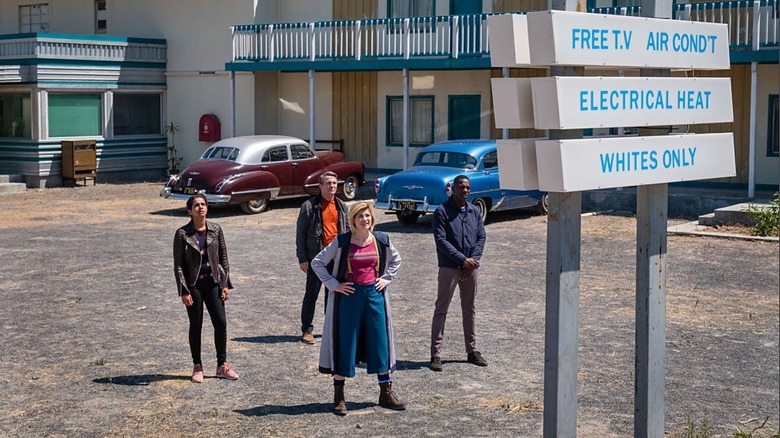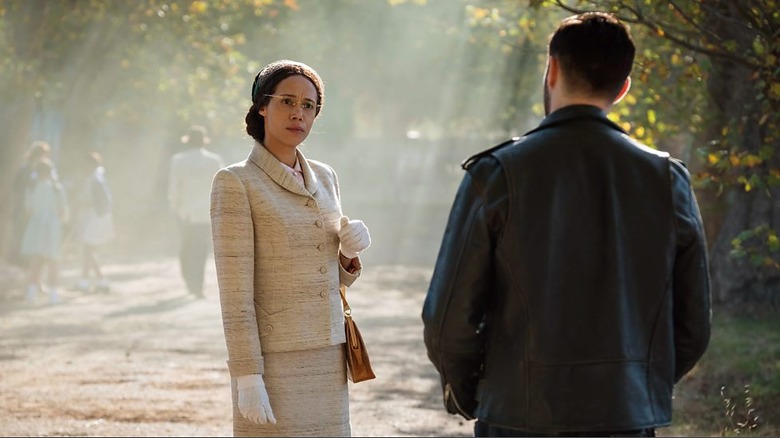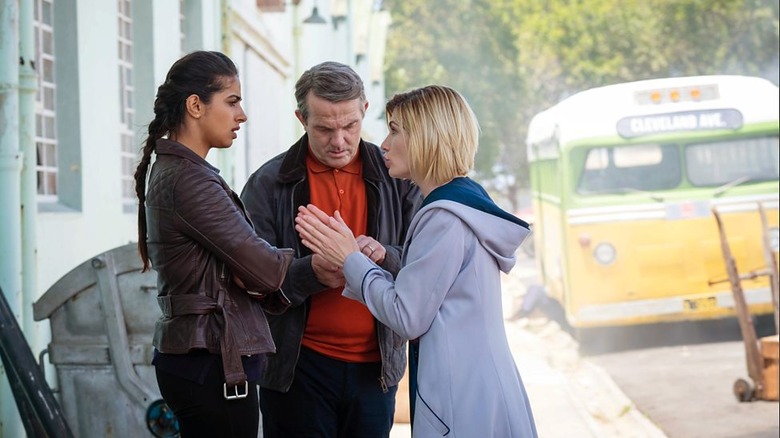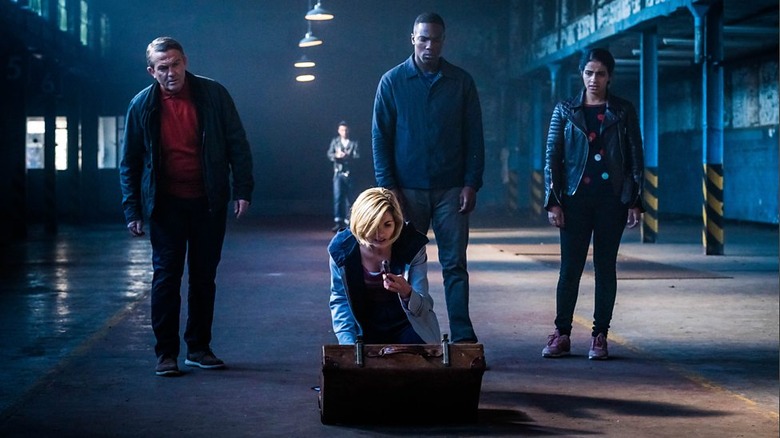History Is Made On 'Doctor Who' In The Powerful 'Rosa'
The Doctor has tangled with plenty of historical figures before but — as seems to be the trend with this new season of Doctor Who — "Rosa" is unlike any of those past jaunts in history. The third episode of Doctor Who season 11 takes Team TARDIS to 1955 Montgomery, Alabama, where the Doctor, Yaz, Ryan, and Graham stumble into Rosa Parks on the eve of her big history-making bus protest. But contrary to what we've seen in Doctor Who before, "Rosa" plays it completely straight, foregoing the sci-fi show's usual whimsy in favor of a hard-hitting, utterly empowering episode television.
Making History
This season of Doctor Who has made history with its most diverse teams in front of and behind the camera, but "Rosa" finally bears the fruit of those labors. Co-written by Malorie Blackman and showrunner Chris Chibnall, "Rosa" is a first for Doctor Who in many ways — it sheds the show's usual penchant for artifice and allegory (Doctor Who doesn't usually talk about segregation but it just loves bringing back lizard people), and it forces the Doctor to grapple with the distressing realities of having a multi-ethnic companion group. Even when black companions like Martha Jones and Bill Potts traveled on the TARDIS, Doctor Who mostly hand-waved away any issues with people of color traveling back in time. Martha had her stint as a bullied maid in Human Nature, and the Doctor gallantly punched a racist 19th century lord who insulted Bill, but "Rosa" is the first to confront racial issues head-on.
After 14 attempts to land back in Sheffield, the Doctor is intrigued by traces of artron energy showing up in 1955 Alabama and excitedly races off to investigate. The team eagerly joins behind her — strangely, not giving much thought to the fact that it's 1955 Alabama. But they're soon given a jarring reminder of that when Ryan is slapped in the face and threatened with a lynching after he tries to return a woman's handkerchief. It's a harrowing moment that brings with it all the weight of history. The emotions run raw in this brief scene — which sees Rosa Parks (Vinette Robinson) stepping in before things get out of hand — in a way that Doctor Who has rarely tapped into before. The episode doesn't pull any punches, showing the group getting thrown out of a restaurant, getting glared at on buses, and narrowly escaping suspicious law enforcement. The Doctor is shaken by these events, but Ryan and Yaz have to deal with the brunt of it, leading to the show's most poignant and nuanced conversations about race. "Never give them the excuse," Ryan and Yaz say, reciting the mantra imparted on them by their parents. While Ryan despondently says that Rosa Parks didn't end racism, Yaz argues, "But they don't win, those people. I can be a police officer now cos people like Rosa Parks fought those battles for me."
Changing History
It's fitting, then, that the villain of the episode is basically a neo-Nazi in space. Rocking a vortex manipulator and a temporal displacement weapon, the dashing Krasko (Josh Bowman) could draw more than a few comparisons to a certain Captain Jack Harkness, but he is no more than a racist wannabe. Revealed to have been released from the galaxy's maximum security prison Stormcage, Krasko has a vendetta against Rosa Parks that mostly goes unexplained. But once he calls Ryan "your kind," it immediately becomes clear — Krasko wants to change history for the worse.
Krasko is intent on making sure that Rosa Parks never kickstarts the Civil Rights movement in the U.S. through the ripple effect of "tiny actions": a missed bus, a different bus driver, a smaller set of passengers. But the Doctor, Yaz, Ryan, and Graham quickly scramble to keep history on track. The team dynamic is once again firing on all cylinders here, with the Doctor working her way through a plan and sending the group on individual missions. I've been trying to nail the dynamic of the team for the past few episodes, but seeing them play off each other and split up here reminds me of the gang in Buffy the Vampire Slayer. That's not just because Jodie Whittaker's Doctor is a fast-talking blonde superheroine either — there's an equality and comfortability to Team TARDIS's dynamic that is proving to be incredibly fun to watch. Yaz and Ryan flirting! Ryan and Graham gleefully goading a racist bus driver! Graham posing as Steve Jobs! Plus it's so refreshing to see the Doctor thinking out loud and working her way through a plan with input from the group.
But there's a softer element of this group that I'm glad the show has maintained since Ryan and Graham's rather tragic introduction. Grace O'Brien, Ryan's grandmother and Graham's wife, still strikes a strong presence in the show (and a pivotal narrative plot point) and doesn't fade as many fridged characters have before her.
The Promise of Tomorrow
"Rosa" is another bloodless episode of Doctor Who (the episode explains this away with a neural restrictor implanted in Krasko that prevents him from killing — how very Spike), but that doesn't make it feel any less impactful. The episode builds to a powerful emotional climax that plays out just as breathlessly as an action set piece.
A lot of this is thanks to Vinette Robinson's turn as Rosa Parks, delivering a calm, measured and very deliberate performance that anchors the story. The episode never forgets that Rosa is the hero of the story, and hands her the agency in an episode where time travelers and villains scramble around her. Throughout it all, she remains unruffled and steadfast in her convictions, which is truly the perfect way for Doctor Who to depict Rosa. Still, it is a little agonizing when the Doctor and Graham realize that they have to play a part in Rosa's arrest (Graham protesting, "I don't want to be part of this" is just heartbreaking). But oh boy, does it lead to an all-time great moment in Doctor Who. It's a moment we've read about or seen plenty of times before, but the scene when Rosa calmly refuses the bus driver pays off spectacularly here. I'm on the fence on the use of Andra Day's "Rise Up" — which has been overused to high heaven in inspirational movie trailers and Hillary Clinton rallies — but this episode knows how powerful it is, and Doctor Who not going to pass up the opportunity to play this song.
The heavy-handed depiction of racism could be a turn off for some viewers, but "Rosa" is a poignant piece of television that, at its core, is what Doctor Who was created for. To educate children in both history and empathy, and to make us cry our guts out.
Time and Space Tidbits




